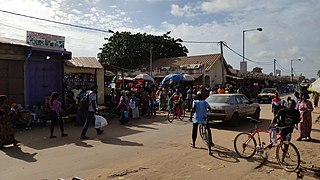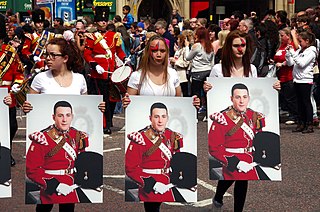Related Research Articles

The Gambia, officially the Republic of the Gambia, is a country in West Africa. Geographically, The Gambia is the smallest country in continental Africa; it is surrounded by Senegal, except for its western coast on the Atlantic Ocean. It is situated on both sides of the lower reaches of the Gambia River, which flows through the centre of the country and empties into the Atlantic Ocean. The national namesake river demarcates the elongated shape of the country, which has an area of 11,300 square kilometres (4,400 sq mi) and a population of 2,468,569 people in 2024. The capital city is Banjul, which has the most extensive metropolitan area in the country; the second- and third-largest cities are Serekunda and Brikama.
Omar Bakri Muhammad is a Syrian Islamist militant leader born in Aleppo. He was instrumental in developing Hizb ut-Tahrir in the United Kingdom before leaving the group and heading to another Islamist organisation, Al-Muhajiroun, until its disbandment in 2004.
The Hofstad Network was an Islamic terror group composed mostly of Dutch citizens. The terror group was composed mainly of young men between the ages of 18 and 32. The name "Hofstad" was originally the codename the Dutch secret service AIVD used for the network and leaked to the media. The name likely refers to the nickname of the city of The Hague, where some of the suspected terrorists lived. The network was active throughout the 2000s.

Brikama is one of the largest cities in the Gambia. It is also called 'Satey Ba' by the locals, meaning "big town". It lies southwest of the country's capital, Banjul. Brikama is the headquarters of the Brikama Local Government Area, and is the largest city in the region containing over twenty five wards with a population of over 100,000. As per the 2013 census, the population of Brikama LGA is 730,895.
Haroon Rashid Aswat is a British terrorist who has been linked to the 7 July 2005 bombings in London. American officials allege that he has ties to al Qaeda, and have sought his extradition to the United States, which is supported by the British government. After his internment in Broadmoor Hospital in 2008, in 2010 the European Court of Human Rights blocked efforts to extradite Aswat due to concerns over the conditions of his potential imprisonment in the United States. This decision was upheld on 11 September 2013, meaning that he can not be extradited while under treatment for paranoid schizophrenia.
The Dos Palmas kidnappings was a hostage crisis in southern Philippines that began with the seizing of twenty hostages from the affluent Dos Palmas Resort on a private island in Honda Bay, Palawan, by members of Abu Sayyaf on May 27, 2001, and resulted in the deaths of at least five of the original hostages. Three of these hostages were American citizens, Guillermo Sobero, and a married missionary couple, Gracia and Martin Burnham. At least 22 Filipino soldiers were killed in attempts to apprehend the captors and free the hostages in the 12 months following the initial hostage taking. An unknown number of captors were killed by government forces.
The 2006 Ontario terrorism case is the plotting of a series of attacks against targets in Southern Ontario, Canada, and the June 2, 2006 counter-terrorism raids in and around the Greater Toronto Area that resulted in the arrest of 14 adults and 4 youths . These individuals have been characterized as having been inspired by al-Qaeda.
Rashid Rauf was an alleged Al-Qaeda operative. He was a dual citizen of Britain and Pakistan who was arrested in Bhawalpur, Pakistan in connection with the 2006 transatlantic aircraft plot in August 2006, a day before some arrests were made in Britain. The Pakistani Interior Minister, Aftab Ahmed Khan Sherpao, claimed that "he is an al Qaeda operative with linkages in Afghanistan". He was identified as one of the ringleaders of the alleged plot. In December 2006, the anti-terrorism court in Rawalpindi found no evidence that he had been involved in terrorist activities, and his charges were downgraded to forgery and possession of explosives. A 2022 article offers an assessment of the impact of Operation Overt and refers to Rauf's alleged role
Mirsad Bektašević, alias Maximus, is a Swedish citizen born in Montenegro, Yugoslavia who in 2005 was arrested in Sarajevo, Bosnia and Herzegovina, charged with planning a terrorist attack against an unnamed target. Bektašević was convicted in 2007 alongside three other men and sentenced to 15 years and 4 months of imprisonment.
The Gambian Cup is the top knockout tournament of the Gambian football. The current champion is Real Banjul who won their four title in 2019. The winner competes in the Gambian Super Cup and also qualifies into the CAF Confederation Cup each season, if the national league champion also wins the FA cup then the second placed cup club competes.

Lesbian, gay, bisexual, and transgender (LGBT) people in the Gambia face significant challenges not experienced by non-LGBT residents. Same-sex sexual activity is illegal for both men and women in the Gambia. Criminalisation commenced under the colonial rule of the British. The 1933 Criminal Code provides penalties of prison terms of up to fourteen years. In 2014, the country amended its code to impose even harsher penalties of life imprisonment for "aggravated" cases. The gender expression of transgender individuals is also legally restricted in the country. While the United States Department of State reports that the laws against homosexual activity are not "actively enforced", arrests have occurred; the NGO Human Rights Watch, reports regular organised actions by law enforcement against persons suspected of homosexuality and gender non-conformity.
The Vollsmose terrorists were three men convicted of attempted terrorism in Denmark in 2007–2008. Nine men were initially arrested by Danish police in the Vollsmose neighbourhood of Odense on 5 September 2006, but most were later released without charges, including a police mole who played a role in the investigation and trial. Four men were charged with attempted terrorism, three of whom were convicted. According to Danish police, the group had been under investigation for quite a while.
Babar Ahmad is a British Muslim of Pakistani descent who spent eight years in prison without trial in the United Kingdom from 2004 to 2012 fighting extradition to the United States. The US accused him of providing material support to terrorism via a website that he set up in the UK in 1996 to publish stories about the conflicts in Bosnia and Chechnya, but which in 2000–2001 allowed two articles to be posted on the site offering support to the then Taliban government in Afghanistan. The US accepted that the website was operated from the UK but claimed jurisdiction because one of the servers hosting the website was located in the US. He fought a public eight-year legal battle, from prison, to be tried in Britain but the British Crown Prosecution Service concluded that there was "insufficient evidence to prosecute" him.

In the United States, a common definition of terrorism is the systematic or threatened use of violence in order to create a general climate of fear to intimidate a population or government and thereby effect political, religious, or ideological change. This article serves as a list and a compilation of acts of terrorism, attempts to commit acts of terrorism, and other such items which pertain to terrorist activities which are engaged in by non-state actors or spies who are acting in the interests of state actors or persons who are acting without the approval of foreign governments within the domestic borders of the United States.

The 2006 transatlantic aircraft plot was a terrorist plot to detonate liquid explosives, carried aboard airliners travelling from the United Kingdom to the United States and Canada, disguised as soft drinks. The plot was discovered by British Metropolitan police during an extensive surveillance operation. As a result of the plot, unprecedented security measures were initially implemented at airports. The measures were gradually relaxed during the following weeks, but passengers are still not allowed to carry liquid containers larger than 100 ml onto commercial aircraft in their hand luggage in the UK and most other countries, as of 2023.
On June 5, 2010, in a covert American anti-terrorism operation named "Operation Arabian Knight", two American citizens Mohamed Mahmood Alessa and Carlos "Omar" Eduardo Almonte, New Jersey residents, were arrested at Kennedy International Airport in New York City. The men were in the process of boarding booked, separate flights to Egypt. According to the affidavit filed in support of the federal criminal complaint, they planned to travel to Somalia to join Al-Shabab, an Al Qaeda-linked terrorist group recruiting foreigners for its civil war. They intended to join them in killing American troops in Somalia, although few Americans are stationed there. The two men were charged with conspiring to kill, maim, and kidnap people outside the U.S.
Failed terrorism plots are terrorist plots that have either been foiled, uncovered by authorities or failed through mistakes.

On the afternoon of 22 May 2013, a British Army soldier, Fusilier Lee Rigby of the Royal Regiment of Fusiliers, was attacked and killed by Islamist terrorists Michael Adebolajo and Michael Adebowale near the Royal Artillery Barracks in Woolwich, southeast London.
References
- 1 2 3 "Soldier kidnap plotter given life". BBC News. 18 February 2008. Archived from the original on 21 February 2008. Retrieved 18 February 2008.
- 1 2 Jenkins, Russell; McGrory, Daniel (1 February 2007). "How al-Qaeda 'tried to bring Baghdad to Birmingham'". The Times. London, UK. Archived from the original on 24 February 2007. Retrieved 6 July 2007.
- 1 2 Jenkins, Russell; Daniel McGrory, Stewart Tendler and Dominic Kennedy (1 February 2007). "Muslim soldiers 'faced kidnap and beheading'". The Times. London, UK. Archived from the original on 11 February 2007. Retrieved 8 February 2007.
- ↑ Casciani, Dominic (18 February 2008). "The jihadi and the beheading plot". BBC News. Archived from the original on 22 February 2008. Retrieved 18 February 2008.
- ↑ "Government terror conduct queried". BBC News. 6 February 2007. Archived from the original on 18 February 2007. Retrieved 29 December 2007.
- ↑ "Man admits plot to behead soldier". BBC News. 29 January 2008. Archived from the original on 1 February 2008. Retrieved 29 January 2008.
- ↑ "World – The Point Newspaper, Banjul, The Gambia". Archived from the original on 28 September 2007. Retrieved 19 February 2007.
- ↑ "Suspect no6 on terror rap". The Sunday People. 11 February 2007. Archived from the original on 26 September 2007. Retrieved 12 February 2007.
- ↑ Jarju, PK (11 February 2007). "Brikama man in UK terror plot". All Gambian. Archived from the original on 27 September 2007. Retrieved 13 February 2007.
- ↑ Chaytor, Rod (10 February 2007). "12 Terror Charges." The Daily Mirror. Archived from the original on 13 October 2007. Retrieved 11 February 2007.
- ↑ "Terror trial: Cleared man speaks out". Birmingham Mail . 19 February 2008. Archived from the original on 30 January 2018. Retrieved 29 January 2018.